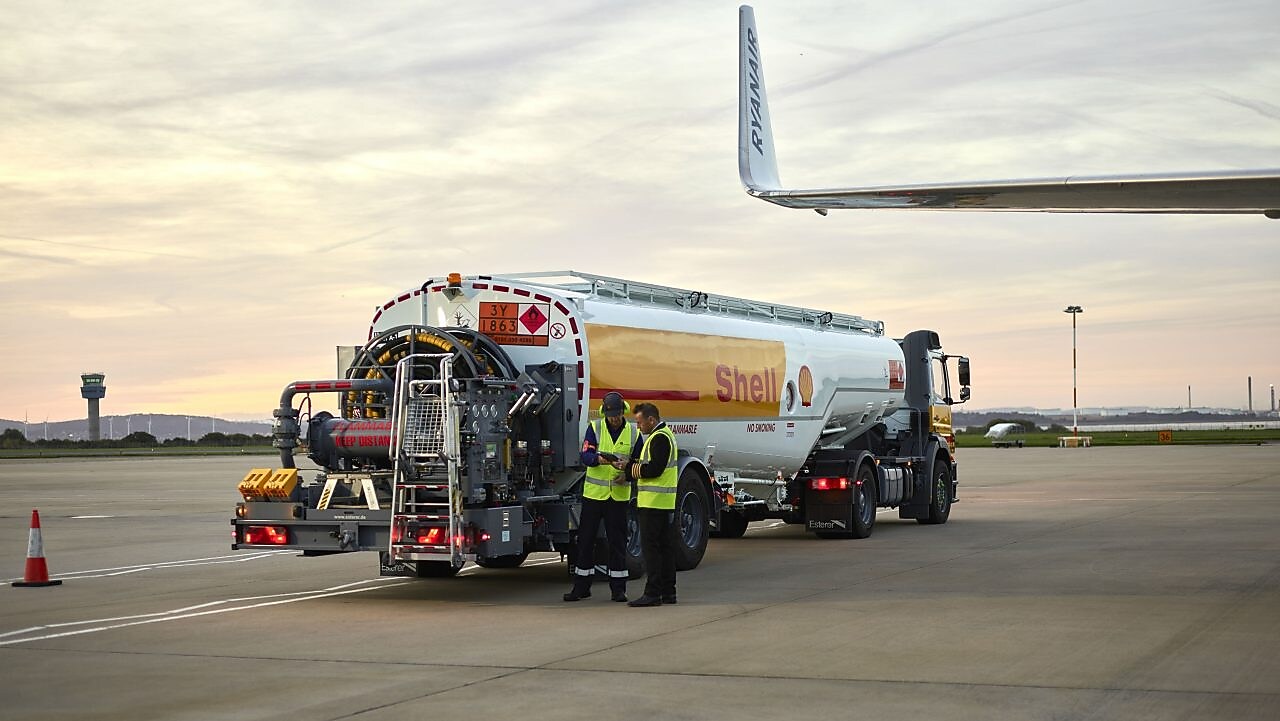
Carbon management solutions
Are you ready for the new era of aviation? Balancing the growth of our industry with the needs of our planet will require bold new innovations to reduce CO2 emissions. So we’ve already started.
Aviation’s window of opportunity - how can we fly and emit less?
Read the transcript
Read the transcript
VOICE-OVER
How can we fly more and emit less?
Since the first flightds, visionaries turned to Shell to help tackle challenges and so enable progress.
Now the aviation industry faces one of its greatest challenges, we all need to work together to avoid, reduce and offset emissions.
Airports play a visible role in reducing emissions. Shell are working with them to achieve this.
In ground operations, Shell electric pump refuellers save fuel and avoid emissions during refuelling.
Around the world, more initatives are being undertaken to increase the supply of Sustainable Aviation Fuel:
At San Francisco International Airport, SkyNRG, World Energy and Shell provide leading airlines with a secure supply.
In the Netherlands, Shell’s partners supply the biofuel to the Dutch Airforce, supported by Shell and SkyNRG.
Together, we also provide Swedavia and seven Swedish airports with their necessary supply.
But supply of Sustainable Aviation Fuel must increase significantly if it’s to maximise its role in reducing emissions.
In a dedicated test facility in Bangalore, Shell are investing in state-of-the-art IH2 technology, to create fuel from waste.
And, in the UK, Velocys, British Airways and Shell are collaborating to develop a waste-to- renewable-jet fuel plant.
Shell plan to invest $300 million over the next 3 years in nature-based solutions helping to protect and regenerate natural ecosystems, preserving nature’s ability to absorb CO2.
Nature has potential to provide more than a third of the climate solution by 2030*.
Nature-based solutions provide verified carbon credits to compensate for emissions, can the aviation industry afford not to use nature-based carbon credits to tackle its emissions while viable alternatives are secured?
The aviation industry has a window of opportunity to plan for sustainable growth. If you’d like to see how Shell can help you develop the right carbon management strategy for your business... our door is open.
Alternative
At San Francisco International Airport, SkyNRG, World Energy and Shell provide leading airlines with a secure supply of Sustainable Aviation Fuel.
In the Netherlands, Shell’s partners supply Sustainable Aviation Fuel to the Dutch Airforce, supported by Shell and SkyNRG.
Together, we also supply Swedavia and seven Swedish airports with Sustainable Aviation Fuel.
There’s never been a more exciting time to work in the aviation industry. IATA, the International Air Transport Association, forecasts that passenger numbers will double to 8.2 billion by 2037. This growth provides amazing opportunity – for the aviation industry as well as individuals, society and global commerce. But the industry must grow responsibly.
- Shell is committed to Avoid and Reduce strategies as the primary means to tackle aviation emissions. However, until these strategies reach scale Aviation can expect a gap in emissions reduction[1] for years to come. As such, Shell see an immediate and valuable role for carbon credits, specifically nature based solutions, to compensate for unavoidable emissions and to act as a bridge to the future and beyond.
Three-tiered approach to Carbon management
Avoid
Where possible we must first avoid creating emissions in the first place. One example of how we are doing this is by piloting the first electric-pump jet refueller in Stuttgart. This helps avoid the unnecessary use of a combustion engine to power the fuel pump, saving fuel and avoiding emissions.
Reduce
We pro-actively reduce emissions wherever possible, and are committed to establishing a secure supply of quality Sustainable Aviation Fuel (SAF) within long-term strategic partnerships like SkyNRG, which is focused advancing the use of sustainable aviation fuel.
Offset
In the short to mid-term carbon offsets remain the most essential lever to achieving our goals. When CO2 emissions cannot be avoided an investment can be made in a project elsewhere. This project captures or reduces CO2 emissions that otherwise would not be captured and issues carbon credits that can be retired to demonstrate that an amount of carbon emissions have been offset.
We provide unbeaten quality assurances by investing in the highest-quality schemes around the world.
Carbon offset credits and Nature-based solutions
According to the Nature Conservancy, nature has the potential to provide more than a one third of the climate solution by 2030 [2]. Shell have selected schemes that are focused on Nature-based solutions (NBS) to reduce the concentration of greenhouse gas in the atmosphere. This is an effective and immediate way to help compensate for unavoidable emissions. [2] Nature Conservancy study 2017
NBS comprise all activities related to the protection, or redevelopment, of natural ecosystems – such as forests, grasslands and wetlands – to lower concentrations of greenhouse gases in the atmosphere. Such activities can lead to the marketing, trading and sale of carbon credits. NBS can also deliver improvements in biodiversity, water quality, flood protection and livelihoods.
For more information, please visit our Nature Based Solutions webpage (Link) or contact a member of Shell Aviation team directly through our site.
1https://www.icao.int/environmental-protection/CORSIA/Documents/CORSIA_FAQs_Update_9Aug18.pdf p.10
